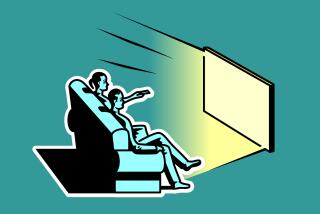Toning Down Yellow Pages
- Share via
In an effort to steer clear of the seedy side of the Internet, California’s largest Yellow Pages publisher is prohibiting some businesses from including their e-mail and Web site addresses in the directory.
The Pacific Bell Directory’s decision to edit advertisements is based on its little-known policy that forbids companies in six “sensitive” categories from listing any Internet information.
The rule covers topics that Pacific Bell believes could convey “possible sexual overtones,” including general massage, massage therapeutic, body piercing, adult entertainers, personal escort services, and singing and entertaining telegrams.
“If an Internet address is listed in one of these ads, it could lead to unrestricted access to information that people could find risque or provocative,” said Sandy Kivowitz, a Pacific Bell Directory spokesman. “We don’t want to be responsible for that.”
The policy reflects an ongoing national trend to screen the Internet, in which many companies and institutions are taking serious--and sometimes costly--measures to self-edit.
One result is that legitimate companies such as Laguna Hills-based StressBusters Massage Co. are being affected.
The firm, a small shop with seven therapists, specializes in prenatal and infant massage. Many of the company’s clientele come from referrals by local obstetricians, orthopedic surgeons and other physicians through Monarch Healthcare Medical Group, said shop owners Michael and Mikki Anderson.
The couple have advertised in the Pacific Bell Yellow Pages for the last nine years and were surprised earlier this month when the directory refused to include their Web site--https://www.stress-busters.org--in the display ad.
The Andersons believe Pacific Bell’s practice is discriminatory and have consulted an attorney about the issue.
“It’s ridiculous that a person can use the Yellow Pages to call up an escort service, but not pull up a Web site for a legitimate business,” said Mikki Anderson.
Legal experts said that the publisher has the right to say what can--or cannot--appear in its listings.
“Even if [StressBusters] wanted to fight it, I’m not sure there’s a 1st Amendment rub,” said Karl Olson, a San Francisco-based media attorney.
Pacific Bell has published the e-mail and Web addresses of businesses in its ads since 1997. Dozens of other directories offer the same service, including GTE Corp. and Ameritech Corp.
Pacific Bell officials said their Web policy prevents the Yellow Pages from becoming a one-stop shopping guide for Internet smut.
When it comes to sexual material on the Internet, there is a growing sense among government, corporate and educational entities that it’s better to err on the conservative side. The federal government repeatedly has tried--and failed--to enact legislation that restricts children’s access to indecent online content. Schools, eager to crack down on Internet smut, have inadvertently blocked links to benign sites.
Companies both online and offline are also toning down ads. Some newspapers have scaled back on risque ads. The Los Angeles Times last year stopped accepting ads for adult clubs and other companies that provide overtly sexual services.
Search engine Infoseek Corp. last fall stopped accepting adult-themed advertising. Soon after, LookSmart Ltd., a search engine with a predominantly female user base, also dropped lucrative ads with adult content, even though they accounted for nearly 10% of its overall ad revenue.
Even fellow Yellow Pages publisher Ameritech doesn’t allow Internet addresses for its adult entertainment category, which includes ads for strippers.
In November, the Chicago-based directory dropped the massage and escort services categories from its paper and electronic listings. It still accepts submissions from massage firms that Ameritech sales representatives deem as legitimate and “therapeutic.”
“We don’t have to run information that we think is offensive,” said Ameritech spokesman Rob Lanesey. “If people want it, they can go elsewhere to find it.”
The Andersons contend that Pacific Bell’s policy unfairly restricts the ability of potential customers to find StressBusters on the Internet. The couple note that the publisher also refused their request to move their ad to a different category.
Pacific Bell officials said that the directory’s subject headings rely on very strict rules, which prevent companies from hopping from one category to another in search of better ad placement.
Some telephone book publishers--including the directory arms at Bell Atlantic and GTE--expressed surprise over PacBell’s policy. Neither have Web or e-mail restrictions.
“We can’t be expected to be responsible for all of the content on the Internet,” said Deanna Kriege, a GTE Directory spokeswoman. Yellow Page directories “are such a competitive industry, we’re just trying to be informative.”
Amid today’s Internet buzz, traditional phone books remain a lucrative market for both regional phone companies and independent directory publishers. Nearly 90% of all consumers still use the Yellow Pages, according to Yellow Pages Publishers Assn., despite growing competition from online commercial listings such as Big Yellow and Switchboard Inc.
The reason: The paper version is portable, free and easy to use.
In California, Pacific Bell’s directory dominates the state’s $2-billion Yellow Pages arena. The company estimates that it controls about 66% of the state’s usage market, where it competes with 52 other publishers.
Pacific Bell, which is owned by telecommunications giant SBC Communications Inc., produces one-fourth of the 400-plus Yellow Page directories in the state. Its Yellow Pages business in California brings in more than $1 billion in revenue annually.
That market dominance is why the Andersons advertise in the Pacific Bell Directory.
“I feel like we can’t afford to go anywhere else,” Anderson said. “I just think it’s ironic that PacBell wants to ‘protect’ people from smut, but will run [adult] ads next to mine.”
In the 1998 directory for the southern part of Orange County, the StressBusters ad sits above three display ads for companies offering 24-hour hot oil rubs, including one called “Naughty & Nice.”
Pacific Bell acknowledges that ad content varies depending on a community region. What Orange County consumers see in their Yellow Pages is different than consumers find in Las Vegas, which has more than 100 pages of ads that are “pretty sexually explicit,” PacBell’s Kivowitz said.
“The issue of the Web addresses is one of control,” Kivowitz said. “We can control what’s in our books. We can’t control what these companies put on the Internet.”
More to Read
Inside the business of entertainment
The Wide Shot brings you news, analysis and insights on everything from streaming wars to production — and what it all means for the future.
You may occasionally receive promotional content from the Los Angeles Times.










